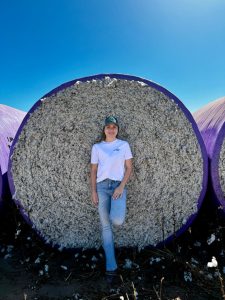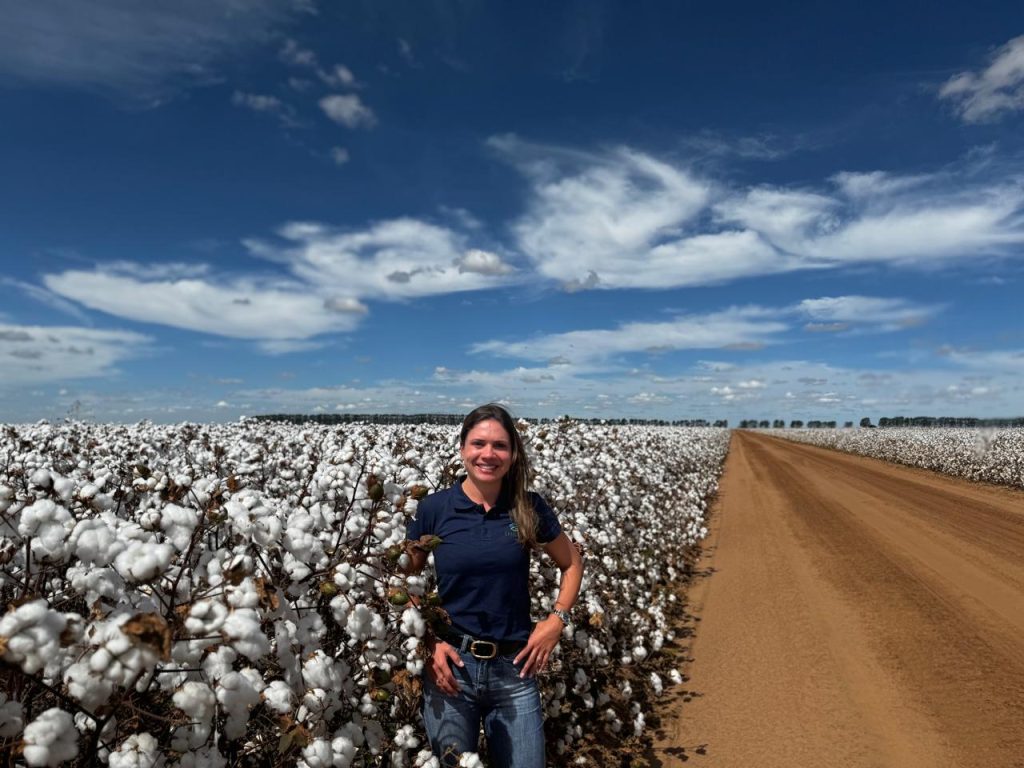Feminine Fields: as a cotton grower Alessandra Zanotto wants to inspire other women to achieve self-development in the cotton chain
Brazilian cotton |
In charge of the Zanotto Group, in the Brazilian state of Bahia, young cotton farmer Alessandra Zanotto is currently one of the most prominent voices in the cotton sector in Brazil.
With a focus on innovating sustainability processes and constantly improving the relationship between producers and consumers, Alessandra stands out as an inspiration for other women working in cotton farming and has been opening up spaces for important debates about working conditions and women working in positions of leadership.
Today, Alessandra is the subject of a series of articles, Feminine Fields, in which we will showcase the work done by women of fibre in Brazilian cotton farming. Check out the interview she gave to the Cotton Brazil team below.

Your connection to cotton farming began early. How did you build up your career in this sector?
A: Ever since I decided to work with my family in farming, cotton was what connected me with people who helped me to gain new knowledge. In cotton farming, I found a place where I could contribute by offering a different perspective from that of my father, who had always run the business alone. I had to prove my point at home first, since the generational clash was significant.
We’ve seen a very positive transformation in the sector over the last 20 years, resulting in a thriving and growing cotton business in Brazil. As a farmer and a leader at the Brazilian Cotton Growers Association, have you seen women’s participation also gaining more space and notoriety within the Brazilian cotton value chain?
A: I see women reaching new spaces in agriculture, in general. Cotton farming, as it requires more careful and analytical processes, may provide more opportunities. But it is still a sector led by men and there is a one-sidedness when it comes to leadership. Women are very present throughout the chain, but not in leadership positions.
What are the biggest challenges when working with cotton and the best opportunities this market has to offer?
A: Cotton farmers in Brazil have been taking a leading role in the continuing story of cotton both here and on the international market. However, it is a chain that has many links and the biggest challenge, I believe, is to get all these links to work closely together. The cotton farmers know how to grow cotton and very well, by the way. Year after year, we seek greater excellence in quality and sustainability, but there is one part that is not under our control, which is the last link in the chain, the consumer.

What we need most is to better understand the customers and introduce ourselves to them, showing what we do and how we do it and helping them make better choices when they go shopping. This requires a radical change in mindset, which involves strategy, investment and time. I believe we are taking the first steps towards this, especially with the Sou de Algodão (“I’m made of Cotton”) movement, which attracts the attention of the end consumer and the players in the textile and clothing chain to the need for more responsible fashion, and natural fibre is best suited to this.
What advice would you give to female entrepreneurs and professionals who are interested in working in this sector?

A: Be resilient and stay calm. The world is undergoing constant transformation and this works in our favour. Self-knowledge is important in order to stay focused and act wisely under any circumstances. I see women as important in building a better, more equal and sustainable future. Not to mention the purchasing power that women consumers have. In cotton farming there is plenty of space for this agenda.
Why is Brazilian cotton a different (or special) product?
A: Brazilian cotton is special not only for its quality, now on a par with its biggest competitors, but it contains much more than that within its fibre. It’s sustainable in a different way because we have the most complete responsible cotton certification program, the ABR Program (Responsible Brazilian Cotton), which is underpinned by our extensive environmental and social legislation.
Furthermore, it incorporates a lot of technology, because without that none of this would be possible in a tropical country like Brazil. And from the point of view of a woman, and a mother, Brazilian cotton is different because it is the result of the effort and love of many families, who invest and take care required to make sure that everything turns out in the best way possible. We are proud of what we do, and we always want to do better.
